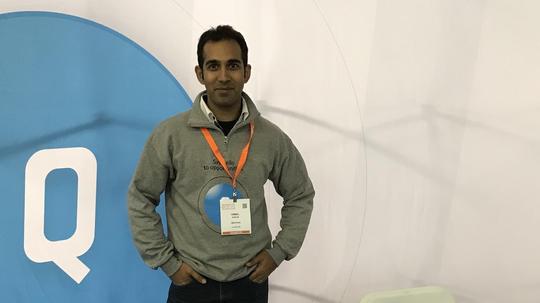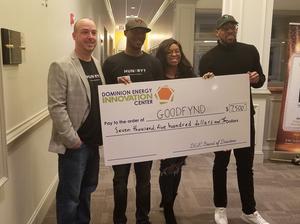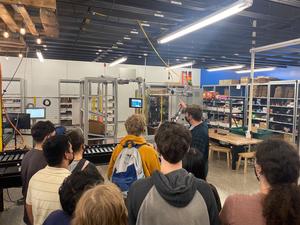
For job candidates who are perfect on paper but fall flat in the interview room, an unlikely helper named Quinn is now on standby to bring wandering answers and uncomfortable behavior up to par.
Derived from the Latin word for an intelligent being, Quinn is the bot at the center of an startup called Quinncia that is undergoing refinement at Lighthouse Labs this fall under the eye of its founder, Himal Ahuja. From the depths of a computer screen, she or he – Ahuja and his team periodically change Quinn’s voice – is the perfect interviewer: eager to listen, quick with feedback and designed expressly to help any jobseeker get an offer.
“Advisors are not able to train students on what to say” in specific interviews, Ahuja said. But Quinn can.
Founded in 2015, Quinncia grew out of a problem Ahuja was facing at Roche Pharmaceuticals, where he was recruiting new team members. After identifying 30 possible candidates who checked every box on the company’s list – education, experience, diversity – Ahuja discovered, to his dismay, that none of them measured up to expectations.
“On paper you’re perfect, but I can’t put you in front of my boss,” he remembered thinking.
At the same time, Ahuja was conscious of the difficulties undergraduates faced in getting advice for the job market, recalling being told by a career advisor he needed to change his foreign-sounding name to something more mainstream on his applications.
“I didn’t feel angry,” he said. “But to say I won’t get interview calls with that – you’re out of touch.”
Ahuja realized he needed an interviewing tool that could objectively assess users’ skills and provide feedback that would help them improve – a tool that wouldn’t fall behind the times, be swayed by preconceptions or get distracted by something that happened earlier in the day.
With friend Steve Farthing (no longer with the company), Ahuja began developing the platform in January 2015 and by November had scored its first customer: Arcadia University in Pennsylvania, which carried out the pilot phase of adoption.
Drawing on data and algorithms, Quinn comes as close to an in-the-flesh interviewer as it gets on a screen. Users upload their resumes to Quinncia and select their industry. Quinn uses their information to ask targeted questions that a typical interviewer would ask while assessing other aspects of their performance, such as rate of speech, how often filler words like “um” or “like” are used, the number of times they smile, whether their answers draw on relevant content and more.
For every question users answer, there are 128 different advice options Quinn can draw on to prompt them to improve in some way. If interviewees are asked about educational experience but never mention a degree they have, for example, Quinn might prompt them to elaborate.
Once the interview is done, Quinncia deploys a second round of advice: an array of information on users’ behavior, such as how long they took to answer questions and how often their faces registered different emotions.
Assessments of the latter kind were enabled by the incorporation of large-scale datasets into the software, Ahuja noted. And because Quinn uses machine learning programs, “the more and more students use it, the smarter it will become on the emotional piece.”
Already, he said, colleges and universities are jumping onboard. By the end of October, the team – eight full-timers – expects to have 20 higher education institutions on its rolls. Down the road, Quinncia hopes to expand into community college systems and veterans’ groups.
“The goal is to bring that career readiness into what essentially should have been a part of education a long time ago,” Ahuja said.
More than students are interested in that goal. Understaffed career services offices – Ahuja said there's one dedicated career advisor for every 3,000 students enrolled in higher education in the U.S. – are eager for assistance in landing students jobs, while dean’s offices are facing increased scrutiny over student outcomes. On the other side of the table, companies want to spend less time and resources screening out unsuitable candidates.
Ahuja is confident that for many of those stakeholders, Quinncia is the missing piece.
“I think it’s a need that will eventually be solved.”




